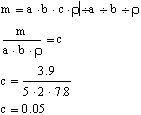|
German Lesson 1 Lesson Table |
CW: Whole-class work |
|
German Lesson 1 Lesson Table |
CW: Whole-class work |
Time |
Description of Activity |
Description of Content |
| 00:25 | Pre-Lesson Activity | |
| 00:48 | CW: Sharing Homework Part 1 (10 min 56 sec) |
A rectangular bowl of
glass with a width of 14.6 cm and a length of 8.4 cm is
filled with 17 mm quicksilver (density 13.6 g/cm3). What
is the mass of the quicksilver? 07:43 What is the mass of a shop window (density 2.6 g/cm3) with a height 2.30 m, width 2.65 m and a thickness of 8.5 mm?  |
| 08:37 | An open balcony has to be covered with lead sheet (length 4.30 m, width 2.35 m). The thickness of the lead is 2 mm and its density is 11.34 g/cm3. What is the mass of the surface? | |
| 11:44 | CW: Working On Tasks/Situations (21 min 11 sec) |
"Who can remember
what we can calculate since yesterday?" - Surface of a rectangular solid - Volume of a rectangular solid - Mass of a rectangular solid 12:41
"How did we calculate the surface of a rectangular
solid?" 13:12 "What is the formula for the
volume?" 13:43 "What is the formula for the
mass?" |
| 14:01 | Goal: "You see an
empty space on the transparency. And at the end of the
lesson you will write in a fourth point- I hope which you
will be able to calculate as well." (Look at
solutions to task 1) 14:19 "I have an exercise for that." An iron sheet (rho equals seven point eight grams per centimeters cubed) with a length of zero point five meters and a width of twenty centimeters weights three point nine zero kilograms. Calculate the height (thickness) of the sheet. 15:04 (How could we solve this problem?) Student 1: Maybe the formula H equals ... M divided by rho divided by A divided by B. Student 2: H equals ... (Teacher interrupts students formulation.) |
|
| 15:49 | Write on the board: what
is given, what are we looking for, calculation path. 17:02 given: a = 50 cm b= 20 cm m = 3900 g to determine: thickness h 21:08 Student: V = c = (Try rejected, its impossible.) Student:   Correction of the unit:  28:13 Student: "Why is it still 7.8?" Repeat the three relations we have stated earlier. "Can it Always be 7.8 or does the number have to change?" 1. Student: Yes it can stay the same but its always different numbers... bigger ones 2. Student: The number can stay like this because the measurement always get bigger as well. "Can you explain that." (Student 2) (Student 2): Decimeter cubed is bigger than centimeters cubed, thousand times. (Student 3): A kilogram is thousand times as big as one gram. "If you have a volume that is 1000 times bigger, what can we say about the weight if the material is the same?" It has to be thousand time bigger as well. 32:32 "Back to our problem, which number did we get and what is the unit?" The height of the sheet of iron is 0.5 cm. |
|
| 35:10 | "I will come back to
the top (of our list of possible calculations)." "Is anybody of you able to say what we just did and what you learned?" |
|
| Student
1: We can calculate the length, height or width of a
rectangular solid. Student 2: Two of the length width or height, the mass and rho. Student 3: We can calculate the length width or the height of a rectangular solid if we have the mass and rho. Teacher: We can change the formula for the mass. |
||
| 36:55 | CW: Setting Up Tasks/Situations (2 min 20 sec) |
(Teacher hands out three
stacks of worksheets for the power group the middle group
and the basic group. The students decide to which group
the want to belong to and choose their worksheet.)
Two rectangular rods are to compare.
The iron rod (spec. weight = 7.8) and the aluminum rod
have a width of 5 cm and a height of 3 cm. The iron rod
weights 15.500 kg, the aluminum rod 4.860 kg. A 3 cm thick copper plate (specific
weight =8.9) is 50 cm long and 30 cm wide. How thick must
be a A receptacle has a rectangular shape and the base area is 40 cm times 30 cm. It is filled with oil (spec. weight = 0.93) and has a weight of 55.800 kg. Calculate the clear height of the receptacle. A rectangular sandstone block (spec. weight = 2.3) is 30 cm wide, 20 cm height and weights 303.600 kg. Calculate the length. A crystal column (spec, weight = 2.7)
has a quadratic base area and a height of 30 cm. The
weight is 5.184 kg. A step of a staircase made of sandstone (spec. weight = 2.3) has a weight of 0.345 t. The step has a height of 20 cm. Calculate the base area. |
| 39:15 | SW: Working On
Tasks/Situations Individually (3 min 17 sec) |
(Teacher explains a group of students the calculation of the unit one more time while the other students are working individually.) |
| 42:32 | CW: Teacher Talk/Demonstration (20 sec) |
"We discussed two difficult things today: One appeared in your homework. Then we clarified why the number stays the same." |
| 42:53 ~43:32 | CW: Working On Homework (39 sec) |
Homework: "Do number 7a and 7c page 83 from your textbook. Whoever wants to work ahead with the exercise that you got can do that." |